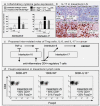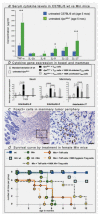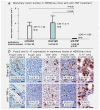Unifying roles for regulatory T cells and inflammation in cancer
- PMID: 19795459
- PMCID: PMC4068029
- DOI: 10.1002/ijc.24923
Unifying roles for regulatory T cells and inflammation in cancer
Abstract
Activities of CD4(+) regulatory (T(REG)) cells restore immune homeostasis during chronic inflammatory disorders. Roles for T(REG) cells in inflammation-associated cancers, however, are paradoxical. It is widely believed that T(REG) function in cancer mainly to suppress protective anticancer responses. However, we demonstrate here that T(REG) cells also function to reduce cancer risk throughout the body by efficiently downregulating inflammation arising from the gastrointestinal (GI) tract. Building on a "hygiene hypothesis" model in which GI infections lead to changes in T(REG) that reduce immune-mediated diseases, here we show that gut bacteria-triggered T(REG) may function to inhibit cancer even in extraintestinal sites. Ability of bacteria-stimulated T(REG) to suppress cancer depends on interleukin (IL)-10, which serves to maintain immune homeostasis within bowel and support a protective antiinflammatory T(REG) phenotype. However, under proinflammatory conditions, T(REG) may fail to provide antiinflammatory protection and instead contribute to a T helper (Th)-17-driven procarcinogenic process; a cancer state that is reversible by downregulation of inflammation. Consequently, hygienic individuals with a weakened IL-10 and T(REG)-mediated inhibitory loop are highly susceptible to the carcinogenic consequences of elevated IL-6 and IL-17 and show more frequent inflammation-associated cancers. Taken together, these data unify seemingly divergent disease processes such as autoimmunity and cancer and help explain the paradox of T(REG) and inflammation in cancer. Enhancing protective T(REG) functions may promote healthful longevity and significantly reduce risk of cancer.
Figures





Comment in
-
Infection, inflammation and cancer.Int J Cancer. 2011 May 1;128(9):2240-1. doi: 10.1002/ijc.25533. Int J Cancer. 2011. PMID: 20602341 No abstract available.
References
-
- Weiss ST. Eat dirt—the hygiene hypothesis and allergic diseases. N Engl J Med. 2002;347:930–1. - PubMed
-
- Fox JG, Beck P, Dangler CA, Whary MT, Wang TC, Shi HN, Nagler-Anderson C. Concurrent enteric helminth infection modulates inflammation and gastric immune responses and reduces helicobacter-induced gastric atrophy. Nat Med. 2000;6:536–42. - PubMed
-
- Belkaid Y, Rouse BT. Natural regulatory T cells in infectious disease. Nat Immunol. 2005;6:353–60. - PubMed
-
- Curiel TJ, Coukos G, Zou L, Alvarez X, Cheng P, Mottram P, Evdemon-Hogan M, Conejo-Garcia JR, Zhang L, Burow M, Zhu Y, Wei S, et al. Specific recruitment of regulatory T cells in ovarian carcinoma fosters immune privilege and predicts reduced survival. Nat Med. 2004;10:942–9. - PubMed
-
- Colombo MP, Piconese S. Regulatory-T-cell inhibition versus depletion: the right choice in cancer immunotherapy. Nat Rev Cancer. 2007;7:880–7. - PubMed
Publication types
MeSH terms
Substances
Grants and funding
LinkOut - more resources
Full Text Sources
Medical
Molecular Biology Databases
Research Materials

